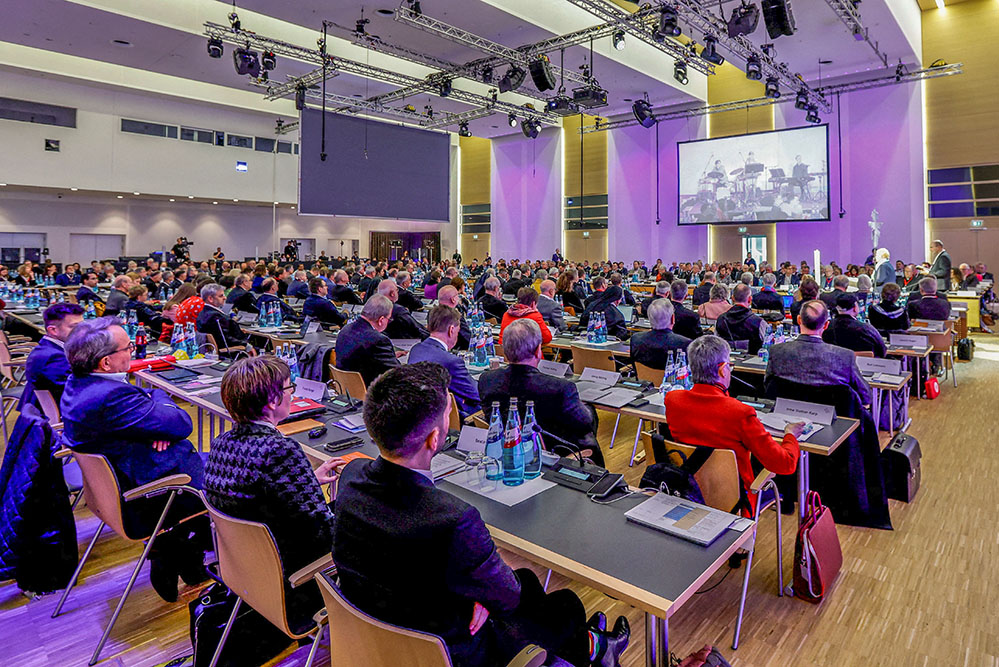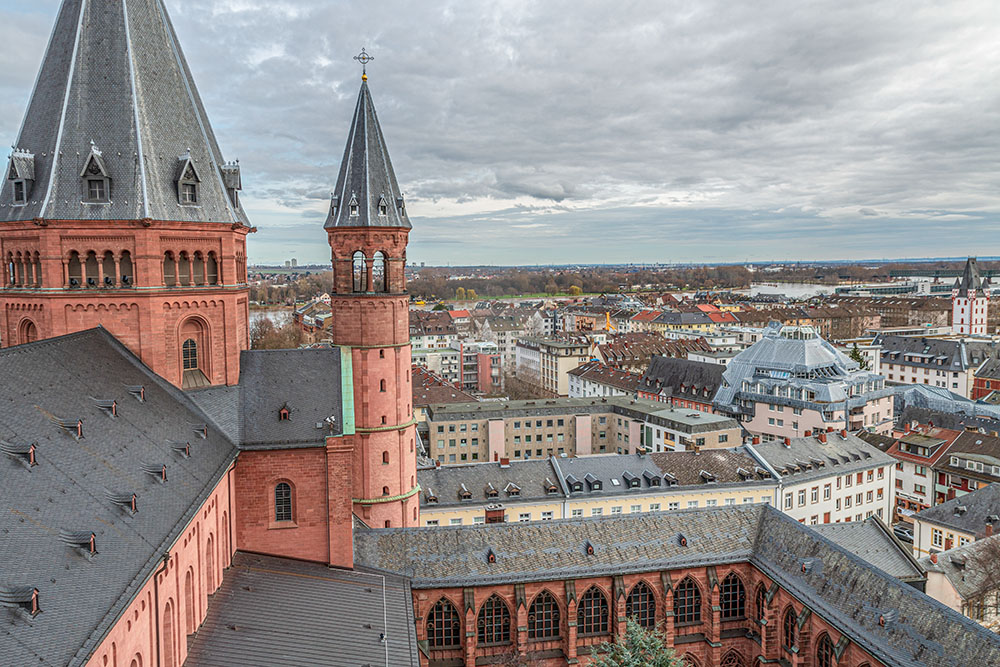
People attend the German Catholic Church's fifth synodal assembly in Frankfurt March 9, 2023. (OSV News/Reuters/Heiko Becker)
For years, the "Synodaler Weg" (Synodal Path) reforms in Germany have caused a rift between reformers and conservatives. Its latest working session showed more conflicts than ever — both with the Vatican and among German Catholics themselves.
It was an uncharted path German Catholics embarked on back in 2019. The abuse scandal had just devastated trust in the church as an institution, and everyone was looking for solutions and a way out of the crisis. The answer: A "Synodal Path" for the church in Germany.
For the first time ever, bishops and laypeople were planning to discuss and vote on far-reaching reforms — as equals. Everything seen as factors contributing to the sexual abuse crisis was put on the table, including priestly celibacy, a lack of women's ordination, and the church's stance on homosexuality.
From the beginning, critics contended there was a threat of schism. Five years into the process, those critical voices are getting louder — outside and within the project.
On June 14-15, reformers gathered in a so-called "Synodal Committee" meeting in the city of Mainz, the next step toward a permanent Synodal Council for Germany.
Whether this council and many other changes will be implemented seems more uncertain than ever.
Advertisement
In the beginning, the "Synodaler Weg" mapped out plans to hold four plenary meetings with 230 delegates — bishops and laypeople — and conclude in 2022, just in time to present the results to the organizers of the worldwide synod on synodality in Rome. The pandemic and internal squabbles delayed the process, with final results now expected in 2026 at the earliest.
In the meantime, the Synodal Committee working sessions — a smaller body of about 70 delegates — are being held twice a year, in an effort to keep the reform work going.
The delay isn't much of a surprise though, as every step the German reformers are taking is unprecedented. Unlike the Australian Plenary Council in preparation for the worldwide synod or the previous German reform-minded Würzburg Synod in the 1970s, the Synodal Path didn't want to be bound by existing rules and canonical restrictions. Organizers created their own, completely new reform process involving laypeople with equal voting power.
This opens the biggest field of conflict in the project. Dicasteries at the Vatican pointed out several times that the German church is prohibited by canon law from taking such steps — especially the implementation of a Synodal Council, where theoretically a bishop could be outvoted by laypeople.
The Holy See went so far as to call for a hiatus of the project last January. In March the heads of the German bishops' conference went to Rome and worked out a compromise: The Synodal Path can continue — for now. But every decision would have to be approved by Rome before being implemented.
Observers were surprised the Vatican was willing to go along with this, as canon lawyer Bernhard Sven Anuth pointed out at the latest working session June 14-15. He called it "remarkable" that the German bishops were able to negotiate this, even if every further step needed approval.
However, in his eyes, Roman approval for an actual Synodal Council would be "impossible," as the "supposed equality" between bishops and laypeople simply does not exist — at least according to canon law.
This was one of the major points of contention at the Mainz meeting. Canon law symbolizes a "millstone around the neck" of much-needed reforms, according to delegate and secular lawyer Charlotte Kreuter-Kirchhof.
But several bishops warned against an open confrontation with the Vatican. "The Synodal Path would end in disaster," insisted Aachen Bishop Helmut Dieser, a prelate generally open to reform ideas.

A view of St. Martin's Catholic Cathedral in Mainz, Germany (Wikimedia Commons/Olaf Kosinsky)
But it's not just the conflict with Rome that is making life hard for German reformers right now. Conservatives as well as reformers have taken a critical stance, for very different reasons.
After the last plenary assembly of the Synodal Path in the spring of 2023, several conservative delegates, bishops and laypeople decided against any further participation in the project. The bishops of Cologne, Regensburg, Passau and Eichstätt left the project, referring to the dispute with the Vatican and to canon law.
This calls into question the ongoing funding — and legitimacy — of the Synodal Path. Four of 27 German dioceses have now stopped supporting the reform path financially. While the other 23 were able to fill the financial gap, the question of legitimacy is still unanswered.
At the moment, four chairs are left empty at the working sessions. Organizers say the conservative bishops are welcome to rejoin at any time. But just what their continued absence means for voting majorities no one has been able to answer yet.
Conservative bishops are not the only internal critics, either. The Central Committee of German Catholics, the liberal lay organization responsible along with the bishops for the Synodal Path, also called its further participation into question. At the committee's own plenary meeting in May, participants termed the behavior of the bishops' conference "disturbing and nontransparent" and questioned whether they could keep working together.
At the moment, four chairs are left empty at the working sessions. Organizers say the conservative bishops are welcome to rejoin at any time.
This arose from a decision by the bishops angered the lay organization, one that had nothing to do with the Synodal Path at all. Last spring, the bishops' conference denied approval of a critical young theologian, Viola Kohlberger, to take an important position in Germany's Catholic Scouting organization — without any reason given.
It was a step even the vice president of the conference, Fulda Bishop Michael Gerber, expressed bewilderment about. "I still don't know the actual reservations," he said at the Mainz working session last weekend.
The Central Committee of German Catholics accused the bishops of creating an atmosphere of distrust. With an 80% majority, the lay organization voted to withhold their continuing cooperation — unless the bishops' showed a willingness to stick to "principles of democracy and transparency."
How will the Synodal Path continue with critics outside and inside? The next working session is scheduled for December. But headlines might come way sooner.
Later this month, German bishops will travel to Rome yet again to present the results of their latest working session and ask for approval from the Holy See. This time, no controversial steps have been taken, so Vatican officials probably won't interfere with the ongoing process right now.
But the sword of Damocles keeps hanging over the head of the German reform project — and German Catholics' own infighting won't improve chances of the Roman Curia approving further reform steps.





